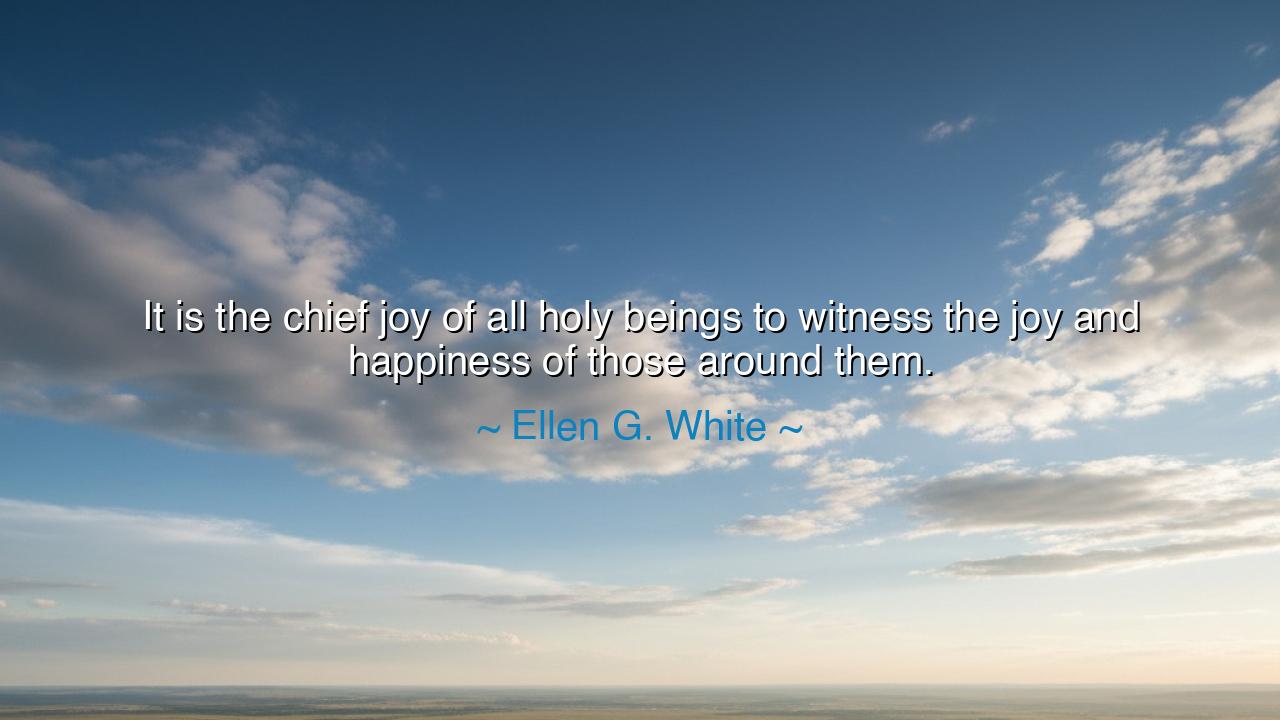
It is the chief joy of all holy beings to witness the joy and
It is the chief joy of all holy beings to witness the joy and happiness of those around them.






The spiritual writer and reformer Ellen G. White, whose voice echoed with divine tenderness and moral conviction, once wrote: “It is the chief joy of all holy beings to witness the joy and happiness of those around them.” These words carry the fragrance of heaven itself, for they reveal the sacred nature of love—a love that rejoices not in self, but in others. In them lies a profound truth: that the highest form of joy is not found in possession or triumph, but in the blessing and uplifting of another soul. To the holy, happiness is not an isolated treasure but a radiant fire meant to warm the hearts of all within its reach.
The origin of this quote can be traced to Ellen G. White’s writings on divine character and human compassion. Living in the nineteenth century, she sought to rekindle in humanity a vision of holiness not as stern judgment, but as selfless benevolence. Her words reflect the celestial order she often described—the angels, radiant with light, finding their deepest delight not in exaltation, but in service. For in the courts of eternity, the purest beings know this law: that joy grows only when it is shared. The universe itself, in White’s vision, is bound together not by force, but by the harmony of love that delights in another’s happiness.
To witness the joy of another and to be moved by it—that is the mark of the divine heart. It is the opposite of envy, the cure for pride. Where selfishness isolates, compassion unites. The holy beings, as White describes them, reflect the character of God Himself, whose delight is not in power, but in mercy. Even creation sings this truth: the sun does not shine for itself, but for all that lives beneath it; the river does not drink its own waters, but gives them freely to field and forest. So too, the heart that has tasted holiness finds its chief joy not in accumulation, but in giving.
History too bears witness to this sacred principle. Consider the life of Florence Nightingale, who left comfort and privilege to walk the blood-soaked corridors of war. Night after night, she tended to the wounded, bringing comfort where there was agony. Her joy was not born of ease or luxury, but of seeing happiness bloom on the faces of men who had once despaired. To her, as to Ellen White, holiness was not a halo to wear, but a light to give. When she saw another smile through pain, she herself was healed. Her life stands as a living parable of White’s teaching: that joy is not diminished when given away, but multiplied a thousandfold.
Ellen White’s insight also reveals a divine paradox—that selflessness is the truest fulfillment of self. Many seek happiness through indulgence or ambition, believing that by taking more they will feel complete. Yet the wise know that this pursuit leads only to emptiness, for joy that begins and ends with oneself is fragile and fleeting. The holy beings, whether angels above or saints below, have discovered the eternal law of love: that by pouring oneself out, one becomes full; by seeking another’s good, one discovers one’s own joy. The heart that blesses others opens itself to heaven’s own blessing.
But this teaching is not only for the saints or the great—it is for every human soul. Each day presents the opportunity to live by this divine rhythm. When you choose kindness over indifference, encouragement over criticism, generosity over selfishness, you partake in the same joy that animates the angels. When you lift another from sorrow or lighten their burden, you step into the circle of the holy, sharing in the eternal music of compassion. You need not change the world to live this truth; it is enough to make one life brighter, one heart lighter, one soul more at peace.
So, my child, take this wisdom as a lamp for your path: if you would find joy, make it your purpose to create happiness in others. Let your soul delight in their laughter, your heart be moved by their peace. Seek not to outshine others, but to help them shine. For when all hearts are glad, your own shall overflow. This is the way of the holy—the way of love that forgets itself and in that forgetting, finds eternal bliss.
Thus, Ellen G. White’s words endure as a beacon across time: the chief joy of all noble souls is not to possess, but to give; not to rise above others, but to lift them higher. To live this truth is to walk in harmony with heaven itself, where every spirit finds its song in the happiness of another. And when humanity learns to share in this divine delight, earth too will begin to resemble the peace and joy of paradise.






AAdministratorAdministrator
Welcome, honored guests. Please leave a comment, we will respond soon